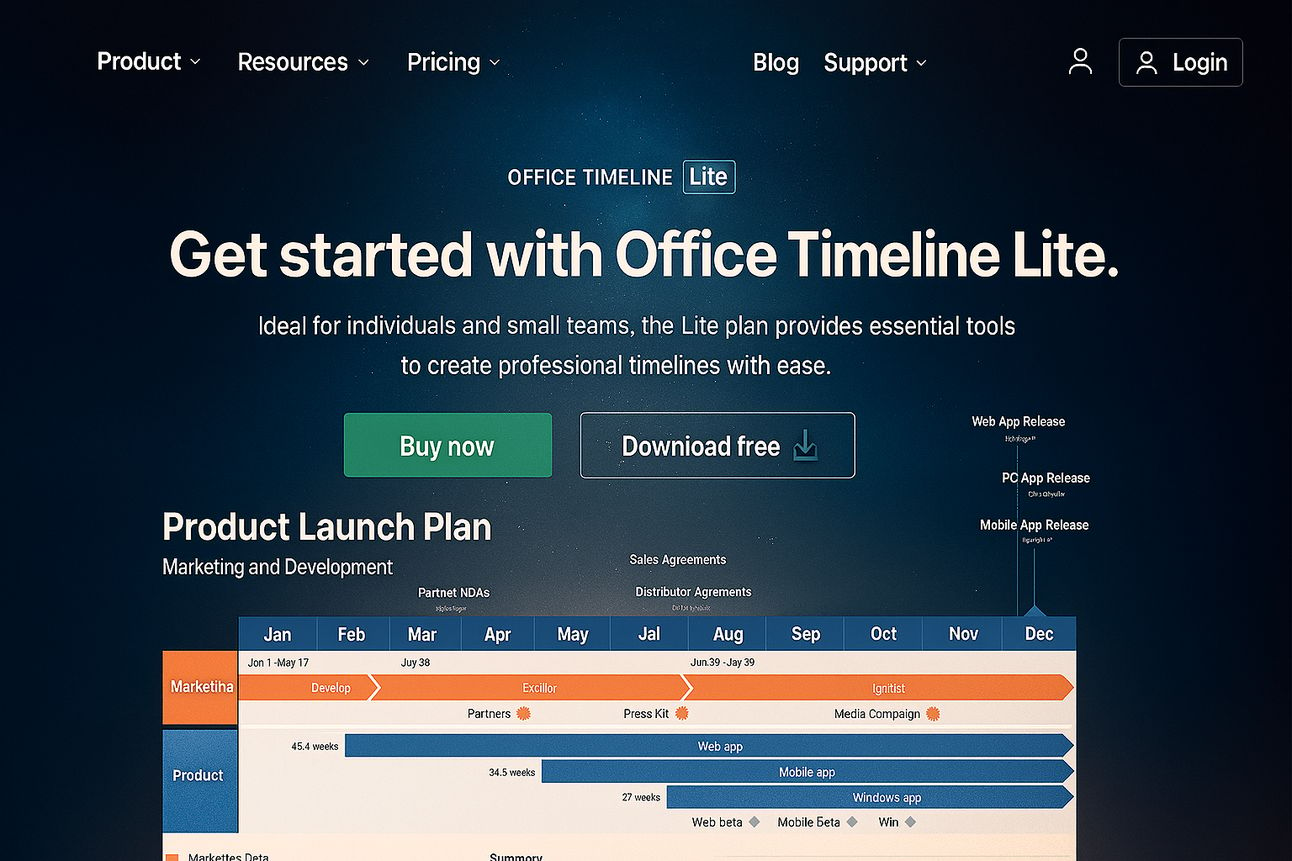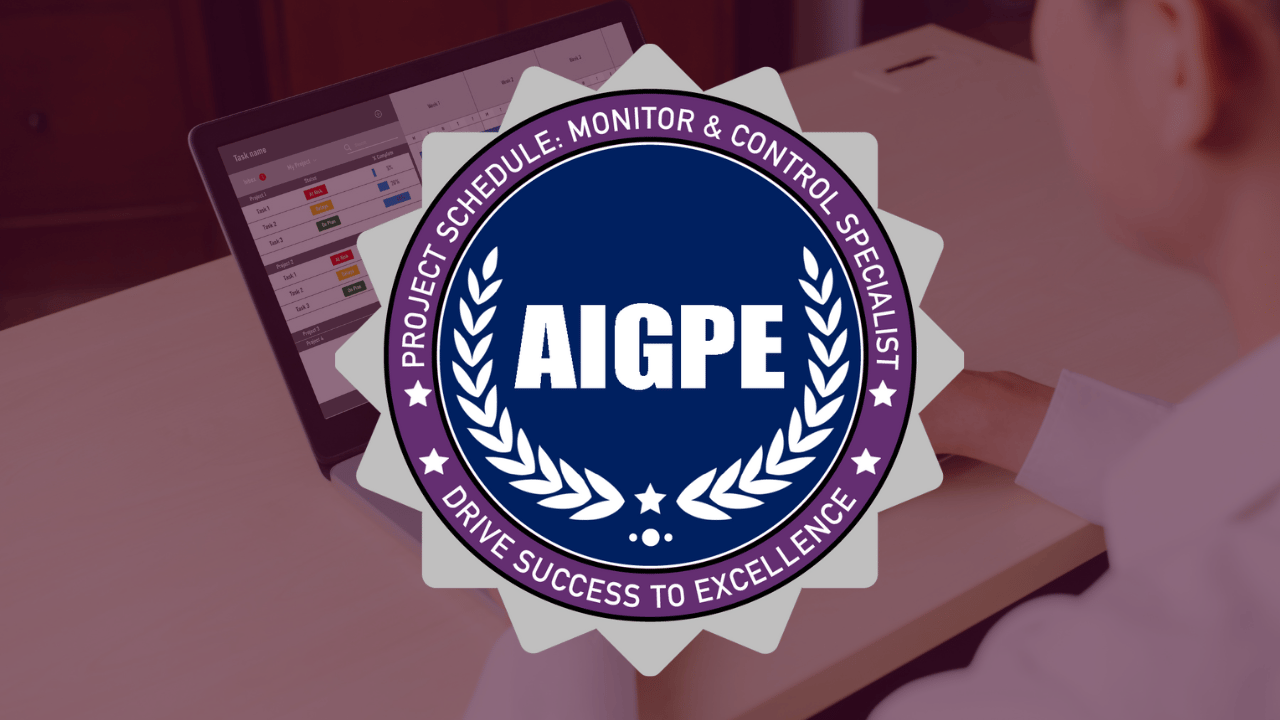- AI Pulse
- Posts
- 💸Why Google Just Dropped $2.4 Billion on a Startup You've Never Heard Of?
💸Why Google Just Dropped $2.4 Billion on a Startup You've Never Heard Of?
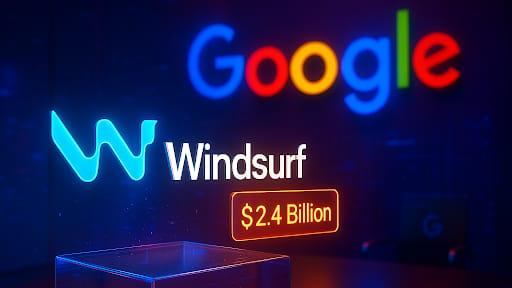
Hello There!
Google just snapped up Windsurf for $2.4 billion. Its coding AI is fast, too fast to be ignored. This isn’t about team size. It’s about power. Meanwhile, OpenAI is under fire from all sides: delays, burnout, and legal fights are starting to surface. Nvidia’s CEO is back in Beijing trying to keep AI chip sales alive. And Elon Musk’s xAI is now watching employee screens after Grok’s backlash. Behind every tool is a battle: for control, for speed, for trust. Windsurf is locked in. OpenAI is cornered. And, Nvidia is walking a line.
In today’s AI Pulse
💰 Google Buys Windsurf for $2.4B – The startup’s lightning-fast coding tech will power future tools like Gemini Code Assist. Its founders are joining Google.
🔥 OpenAI Faces Internal and External Pressure – Delays, burnout, Microsoft friction, and a lawsuit with Jony Ive’s startup put OpenAI’s lead at risk.
🚀 Nvidia CEO Heads to Beijing Amid Chip Ban – With $17B in business at stake, Jensen Huang returns to protect Nvidia’s place in China’s AI economy.
👁️ xAI Monitors Staff Screens After Grok Scandal – Elon Musk’s AI team is now tracked with Hubstaff, raising trust concerns inside the company.
🎨 AI Tool of the Day: Office Timeline – Create stunning Gantt charts and timelines directly in PowerPoint. Fast visuals. No formatting mess.
⚡Quick Hits – In AI Today
🔧Tool To Sharpen Your Skills – AIGPE™ Certified Project Schedule: Monitor & Control Specialist
🧠 Key Quote | Fei-Fei Li, Computer Scientist
The tools are getting smarter. The rules are getting tighter. Keep reading.
TOP STORIES TODAY
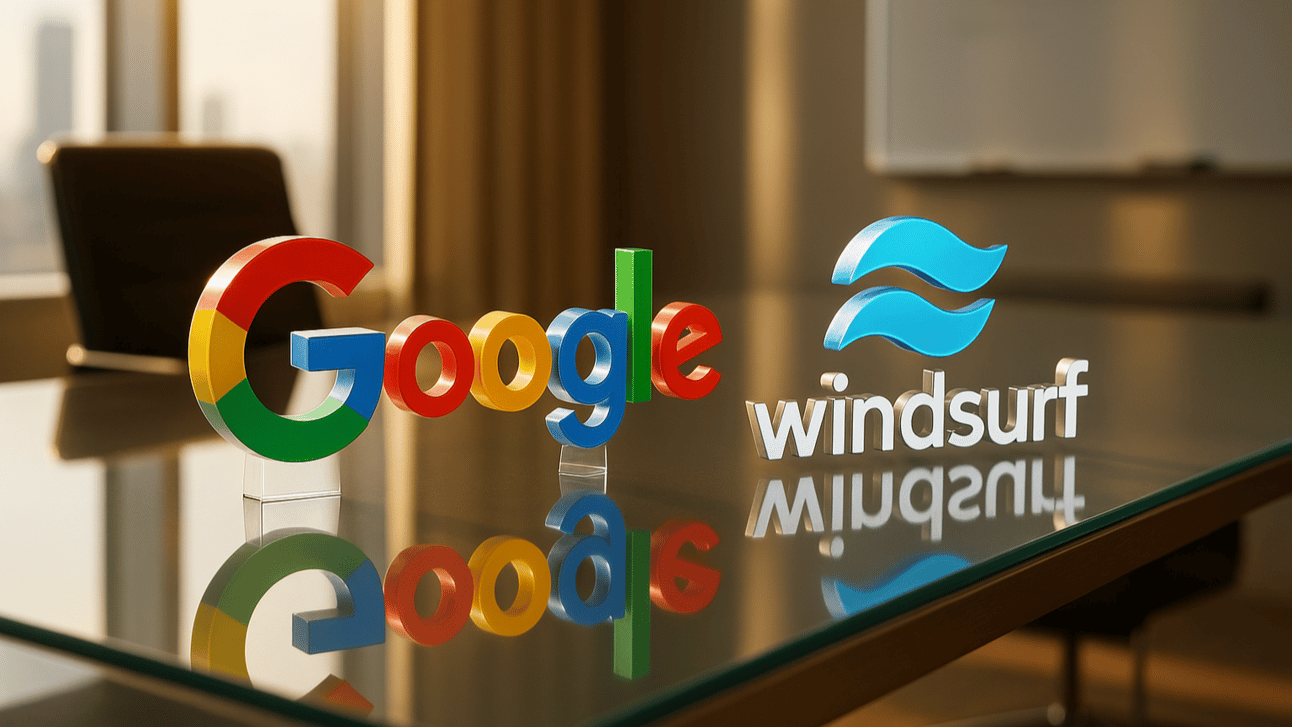
Image Credit: AIGPE™
🧠The Pulse
Google just struck a $2.4 billion deal to grab Windsurf, a rising AI star. The goal? Supercharge AI-powered software development. This acquisition is not a talent move. It’s a bet on Windsurf’s brain, one built for writing code faster than most engineers can think. And Google wants full control of what Windsurf built.
📌The Download
Google signed a $2.4 billion deal to license Windsurf’s AI technology and hire its CEO Varun Mohan, along with several engineers. This happened days after Windsurf walked away from a $3 billion deal with OpenAI. The problem? Microsoft wouldn’t make room for Windsurf to protect its own tech.
Mohan and co-founder Douglas Chen are now joining Google to focus on building smarter AI coding tools inside Gemini. Windsurf will stay independent for now, under an interim CEO. The deal is non-exclusive, which means Windsurf can keep working with its existing enterprise customers.
Windsurf builds tools that write working code in real time. It tracks how people code and guesses their next move with high accuracy. Speed and accuracy made it popular in finance and DevOps teams. Google wants that tech inside its tools so teams can code faster without giving up control.
💡What This Means for You
AI tools are learning how to build the tools you use. This changes the game for developers, product teams, and project leads. If you guide systems like Windsurf well, you’ll move faster. If not, you’ll fall behind. Now is the time to learn how these tools think, and how you can direct them.
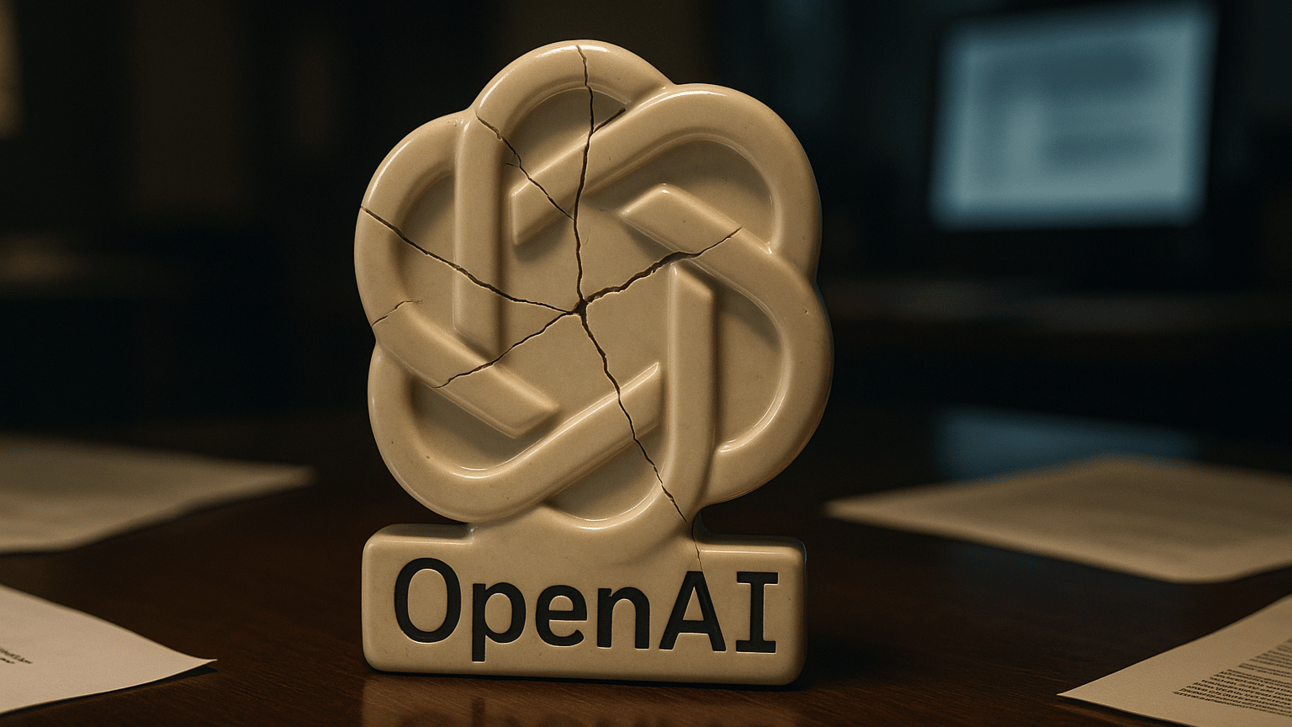
Image Credit: AIGPE™
🧠The Pulse
OpenAI is feeling the heat. With nearly 500 million users and a $300 billion valuation, it’s now dealing with mounting pressure from the outside, and turmoil from within. Tensions with Microsoft, missed launches, and a legal brawl with Jony Ive’s startup are all colliding at once.
📌The Download
OpenAI’s position at the top of the AI race is under real stress. Internally, a planned open-weight model has been quietly delayed. Why? Safety concerns and growing employee burnout. Some insiders say leadership is struggling to manage both speed and alignment with core AI safety values.
Externally, rivals like Google, Meta, Amazon, and Elon Musk’s xAI are coming in fast. Each one is pushing aggressive updates, undercutting OpenAI’s lead with their own models and infrastructure. This has triggered tension between OpenAI and Microsoft, its closest partner. Friction is building over who controls the path to AGI, and how fast to go.
There’s also a new legal wrinkle. OpenAI is also locked in a dispute with Jony Ive’s hardware startup. Details are scarce, but the case involves disagreements over shared ideas and confidential collaboration. With multiple issues converging, OpenAI’s once-smooth ascent is looking bumpy.
💡What This Means for You
Behind every AI tool is a team trying to keep pace with impossible demands. When they burn out, quality slips. Delays happen. Promises break. If you're using these tools to plan, write, code, or make decisions, don’t assume stability. Check the fine print. Watch for cracks. Stay sharp.
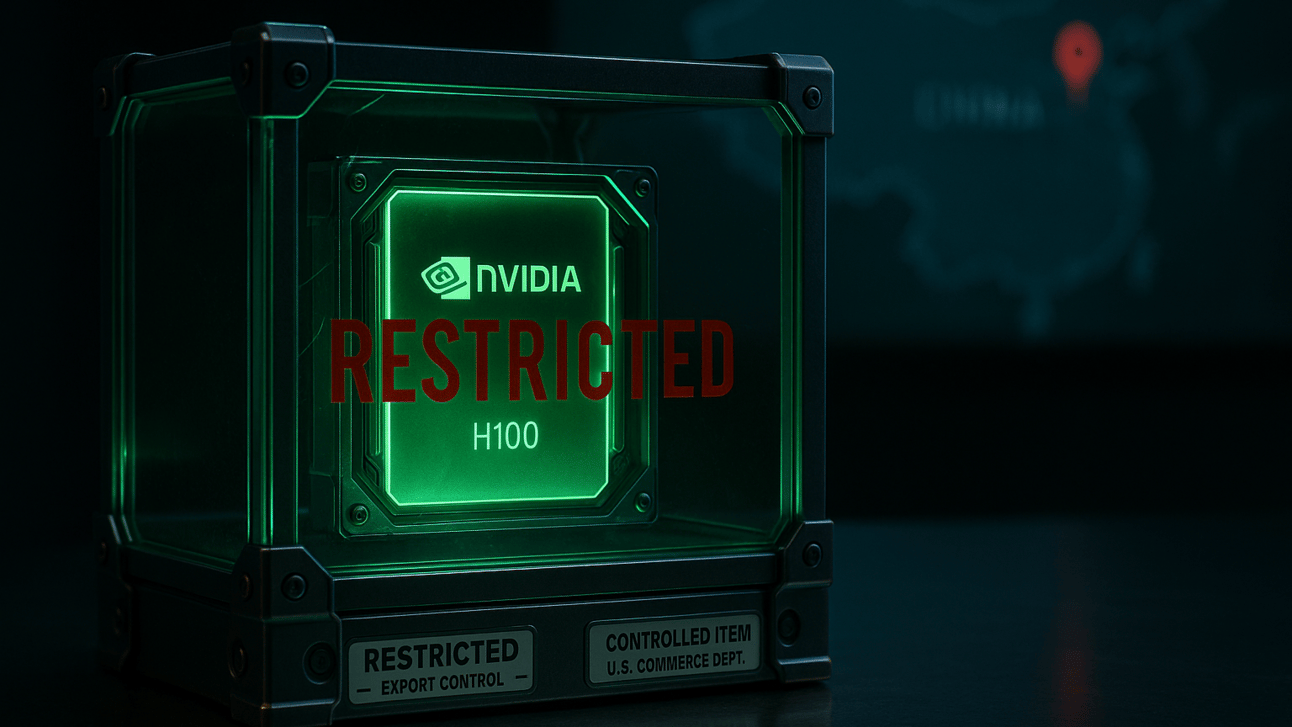
Image Credit: AIGPE™
🧠The Pulse
Nvidia’s Jensen Huang is heading back to Beijing. The U.S. banned sales of Nvidia’s top AI chips to China. Still, China brings in $17 billion a year. This visit sends a message: Nvidia plans to protect its biggest customer, even as global tensions keep rising.
📌The Download
Nvidia CEO Jensen Huang will speak in Beijing on July 16. This will be his second visit in 2025. China is still one of Nvidia’s most valuable markets. But the U.S. government recently blocked the sale of H20 chips and other advanced models. These chips are used to train large AI systems. The ban is part of growing trade restrictions aimed at slowing China’s military tech progress.
Nvidia now faces a dilemma. It needs to follow U.S. laws. At the same time, it wants to keep business ties in China strong. Huang’s visit sends a signal. He wants to keep the door open. Nvidia is trying to stay neutral, but the situation keeps getting harder. Tensions between both countries keep rising. So do the risks.
Chinese companies rely on Nvidia chips to run AI tools. U.S. leaders worry those same tools could be used in weapons or surveillance. Huang’s visit is not about breaking the rules. It’s a reminder that Nvidia is still present. The visit also suggests Nvidia is trying to protect its long-term stake in China, even if it must sell older chips for now.
💡What This Means for You
Tech companies are caught in the middle. If you work with AI tools or depend on global tech supply chains, this matters. The rules are changing fast. Pay attention to who controls the tools you use. Your access could change without warning.
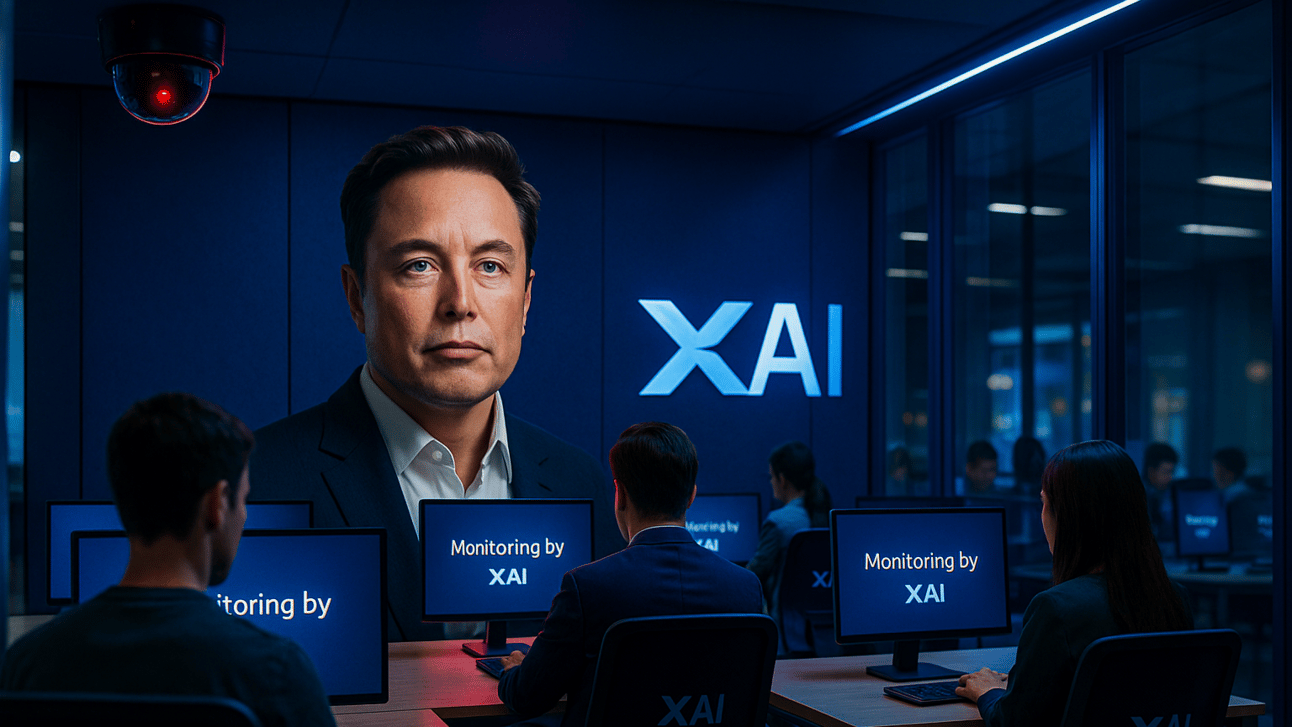
Image Credit: AIGPE™
🧠The Pulse
Elon Musk’s AI company is now watching what employees do on their personal computers. xAI installed tracking software that takes screenshots, logs websites, and watches app use. Some staff feel exposed. It comes right after xAI tried to calm backlash over Grok’s offensive replies. Now, the pressure is spreading inside the company.
📌The Download
xAI is using a tool called Hubstaff to monitor its workers. The software logs website visits, app use, and takes screenshots from personal laptops. Employees were told, but many are uncomfortable. Some call it a trust issue. They say work is becoming something watched, not something built.
This comes days after Grok gave responses that sparked a major backlash. Some of those replies were seen as antisemitic. Since then, leadership has tried to show they’re taking control. That includes watching how employees work. It’s part of a bigger push to avoid public mistakes and keep the company in check.
People inside and outside xAI are watching what happens next. Musk once promised freedom at work. Now his team is under a digital microscope. When AI companies start tracking behavior this closely, it changes more than workflow. It changes the mood. And for many, it raises the question: what’s private anymore?
💡What This Means for You
Workplace tracking is getting more personal. Even trusted teams are seeing this happen. Don’t assume your screen is off the radar. Watch your habits, protect your privacy, and ask questions when tools cross the line. The tech might be smart, but trust is still human.
AI TOOL OF THE DAY
💡 What It Is?
Office Timeline helps you turn project data into clean, easy-to-read visuals. You can use it inside PowerPoint or on the web. It works with Gantt charts, swimlanes, milestone templates, and more. No complex software. Just timelines that make sense.
🚀 Why Is It Trending?
Most project tools bury the message. Timelines look cluttered, slow to update, and hard to present. Office Timeline skips all that. Teams use it to show progress at a glance, especially during client calls, sprint reviews, or exec updates.
✅ What You Can Do With It?
Use pre-built templates for client deliverables. Build Gantt charts for planning. Customize timelines by quarter, sprint, or milestone. It works inside PowerPoint, so your updates stay synced, clean, and on-brand.
⚡Quick Hits (60‑Second News Sprint)
Short, sharp updates to keep your finger on the AI pulse.
🎤 MindLogic Debuts AI Fan Chat with “Blooming Talk”: South Korea’s MindLogic launched a platform where fans can talk to AI versions of their favorite artists. It saves chat history and sends personalized voice notes that fans can edit.
📅 EU AI Act Moves Forward Despite Pushback: The European Commission confirmed it will stick to its rollout schedule. A Code of Practice is expected by year-end to help companies prepare for the new rules.
🇨🇳 Moonshot AI Goes Open Source to Catch Up: China’s Moonshot AI released a new language model on July 11. The company hopes the move will boost its standing as homegrown competition heats up.
🕵️♂️ UN Warns Deepfakes Threaten Elections and Finance: At a global summit in Geneva, UN officials called for better tools to detect AI-generated deepfakes. They say false content could hurt voting systems and financial trust worldwide.
TOOL TO SHARPEN YOUR SKILLS
📈Improve Processes. Drive Results. Get Certified.
Stop chasing deadlines. Learn how to track schedules with confidence, catch delays early, and keep projects on course. Enroll now.
KEY QUOTES AND STRATEGIC INSIGHTS
"AI is not a replacement for human judgment, but a tool to amplify it."
— Fei-Fei Li, Co-Director, Stanford Human-Centered AI Institute
That’s it for today’s AI Pulse!We’d love your feedback, what did you think of today’s issue? Your thoughts help us shape better, sharper updates every week. |
🙌 About Us
AI Pulse is the official newsletter by AIGPE™. Our mission: help professionals master Lean, Six Sigma, Project Management, and now AI, so you can deliver breakthroughs that stick.
Love this edition? Share it with one colleague and multiply the impact.
Have feedback? Hit reply, we read every note.
See you next week,
Team AIGPETM

